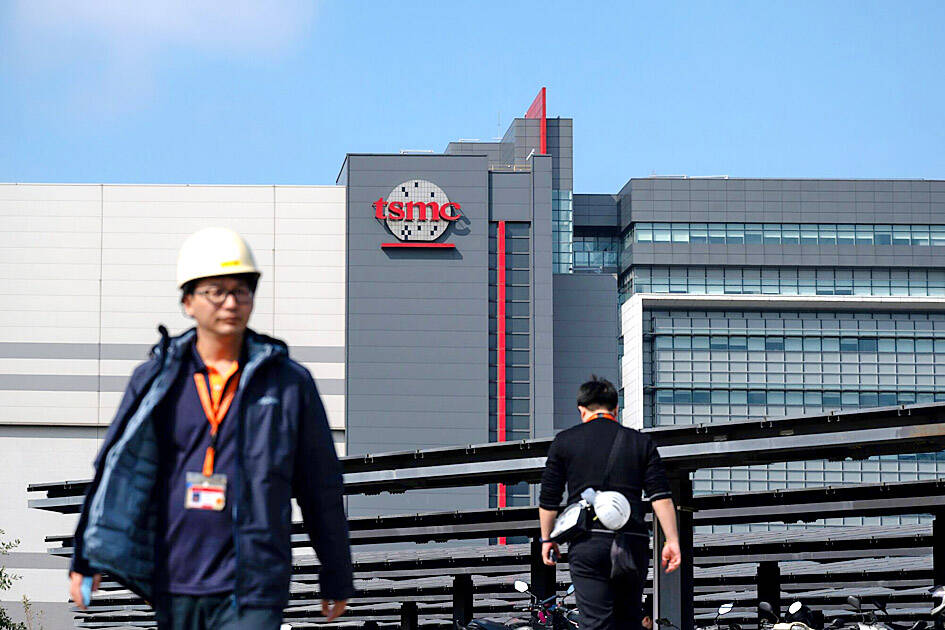Taiwan Semiconductor Manufacturing Co’s (TSMC, 台積電) revenue in the fourth quarter of last year beat estimates of a decline, as demand from artificial intelligence (AI) firms helped offset sluggish smartphone and laptop chip sales.
Hsinchu-based TSMC, the main chipmaker for Apple Inc and Nvidia Corp, reported sales of NT$176.3 billion (US$5.66 billion) for last month, completing a NT$625.53 billion fourth quarter.
The average analyst estimate for sales over the final three months of last year was NT$616.2 billion.

Photo: Mike Kai Chen, Bloomberg
Over the course of last year, TSMC moderated its capital expenditure plans as the consumer electronics industry grappled with a glut of unsold inventory. Overall revenue last year declined 4.5 percent from the previous year to NT$2.16 trillion, it said.
While TSMC outdid analyst expectations and its own guidance, the chipmaker’s fourth-quarter results still fell short of delivering growth. In addition, last month’s sales were down 8.4 percent from a year earlier to hit the lowest level in six months, offering a mixed outlook for the year ahead.
Fellow chipmaker Samsung Electronics Co on Tuesday posted its sixth successive quarter of declining operating profit, as it weathered the impact of muted consumer demand in its smartphone and memory businesses.
Still, the latest report from the Semiconductor Industry Association showed the first growth in chip sales in more than a year in November last year, suggesting momentum is gathering for a resurgence this year.
TSMC executives including chief executive officer C.C. Wei (魏哲家) have said they expect overall business to grow this year, and the company has seen its high-performance computing business boosted by demand for Nvidia and Advanced Micro Devices Inc’s AI chips.

Semiconductor business between Taiwan and the US is a “win-win” model for both sides given the high level of complementarity, the government said yesterday responding to tariff threats from US President Donald Trump. Home to the world’s largest contract chipmaker, Taiwan Semiconductor Manufacturing Co (TSMC, 台積電), Taiwan is a key link in the global technology supply chain for companies such as Apple Inc and Nvidia Corp. Trump said on Monday he plans to impose tariffs on imported chips, pharmaceuticals and steel in an effort to get the producers to make them in the US. “Taiwan and the US semiconductor and other technology industries

CHIP WAR: Tariffs on Taiwanese chips would prompt companies to move their factories, but not necessarily to the US, unleashing a ‘global cross-sector tariff war’ US President Donald Trump would “shoot himself in the foot” if he follows through on his recent pledge to impose higher tariffs on Taiwanese and other foreign semiconductors entering the US, analysts said. Trump’s plans to raise tariffs on chips manufactured in Taiwan to as high as 100 percent would backfire, macroeconomist Henry Wu (吳嘉隆) said. He would “shoot himself in the foot,” Wu said on Saturday, as such economic measures would lead Taiwanese chip suppliers to pass on additional costs to their US clients and consumers, and ultimately cause another wave of inflation. Trump has claimed that Taiwan took up to

A start-up in Mexico is trying to help get a handle on one coastal city’s plastic waste problem by converting it into gasoline, diesel and other fuels. With less than 10 percent of the world’s plastics being recycled, Petgas’ idea is that rather than letting discarded plastic become waste, it can become productive again as fuel. Petgas developed a machine in the port city of Boca del Rio that uses pyrolysis, a thermodynamic process that heats plastics in the absence of oxygen, breaking it down to produce gasoline, diesel, kerosene, paraffin and coke. Petgas chief technology officer Carlos Parraguirre Diaz said that in

Japan intends to closely monitor the impact on its currency of US President Donald Trump’s new tariffs and is worried about the international fallout from the trade imposts, Japanese Minister of Finance Katsunobu Kato said. “We need to carefully see how the exchange rate and other factors will be affected and what form US monetary policy will take in the future,” Kato said yesterday in an interview with Fuji Television. Japan is very concerned about how the tariffs might impact the global economy, he added. Kato spoke as nations and firms brace for potential repercussions after Trump unleashed the first salvo of